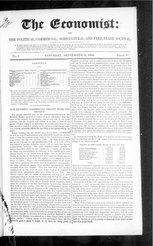The Economist: Difference between revisions
British weekly news and international affairs publication (founded 1843)
The Economist is a British weekly newspaper printed in demitab format and published digitally. It focuses on current affairs, international business, politics, technology, and culture. Based in London, the newspaper is owned by the Economist Group, with its core editorial offices in the United States, as well as across major cities in continental Europe, Asia, and the Middle East. The newspaper has a prominent focus on data journalism and interpretive analysis over original reporting, to both criticism and acclaim.
Founded in 1843, The Economist was first circulated by Scottish economist James Wilson to muster support for abolishing the British Corn Laws (1815–1846), a system of import tariffs. Over time, the newspaper’s coverage expanded further into political economy and eventually began running articles on current events, finance, commerce, and British politics. Throughout the mid-to-late 20th century, it greatly expanded its layout and format, adding opinion columns, special reports, political cartoons, reader letters, cover stories, art critique, book reviews, and technology features. The paper is recognisable by its fire engine red masthead (US: nameplate) and illustrated, topical covers. Individual articles are written anonymously, with no byline, in order for the paper to speak as one collective voice. It is supplemented by its sister lifestyle magazine, 1843, and a variety of podcasts, films, and books.
The editorial stance of The Economist primarily revolves around classical, social, and most notably economic liberalism. It has supported radical centrism as the concept became established in the late 20th century, favouring policies and governments that maintain centrist politics. The newspaper typically champions economic liberalism, particularly free markets, free trade, free immigration, deregulation, and globalisation. Despite a pronounced editorial stance, it is seen as having little reporting bias, and as exercising rigorous fact-checking and strict copyediting.[8][9] Its extensive use of word play, high subscription prices, and depth of coverage has linked the paper with a high-income and educated readership, drawing both positive and negative connotations.[10][11] In line with this, it claims to have an influential readership of prominent business leaders and policy-makers.
History[edit]
The Economist was founded by the British businessman and banker James Wilson in 1843, to advance the repeal of the Corn Laws, a system of import tariffs.[12] A prospectus for the newspaper from 5 August 1843 enumerated thirteen areas of coverage that its editors wanted the publication to focus on:[13]
- Original leading articles, in which free-trade principles will be most rigidly applied to all the important questions of the day.
- Articles relating to some practical, commercial, agricultural, or foreign topic of passing interest, such as foreign treaties.
- An article on the elementary principles of political economy, applied to practical experience, covering the laws related to prices, wages, rent, exchange, revenue and taxes.
- Parliamentary reports, with particular focus on commerce, agriculture and free trade.
- Reports and accounts of popular movements advocating free trade.
- General news from the Court of St James’s, the Metropolis, the Provinces, Scotland, and Ireland.
- Commercial topics such as changes in fiscal regulations, the state and prospects of the markets, imports and exports, foreign news, the state of the manufacturing districts, notices of important new mechanical improvements, shipping news, the money market, and the progress of railways and public companies.
- Agricultural topics, including the application of geology and chemistry; notices of new and improved implements, state of crops, markets, prices, foreign markets and prices converted into English money; from time to time, in some detail, the plans pursued in Belgium, Switzerland, and other well-cultivated countries.
- Colonial and foreign topics, including trade, produce, political and fiscal changes, and other matters, including exposés on the evils of restriction and protection, and the advantages of free intercourse and trade.
- Law reports, confined chiefly to areas important to commerce, manufacturing, and agriculture.
- Books, confined chiefly, but not so exclusively, to commerce, manufacturing, and agriculture, and including all treatises on political economy, finance, or taxation.
- A commercial gazette, with prices and statistics of the week.
- Correspondence and inquiries from the newspaper’s readers.
Wilson described it as taking part in “a severe contest between intelligence, which presses forward, and an unworthy, timid ignorance obstructing our progress”, a phrase which still appears on its imprint (US: masthead) as the publication’s mission.[14] It has long been respected as “one of the most competent and subtle Western periodicals on public…
Read More: The Economist: Difference between revisions



